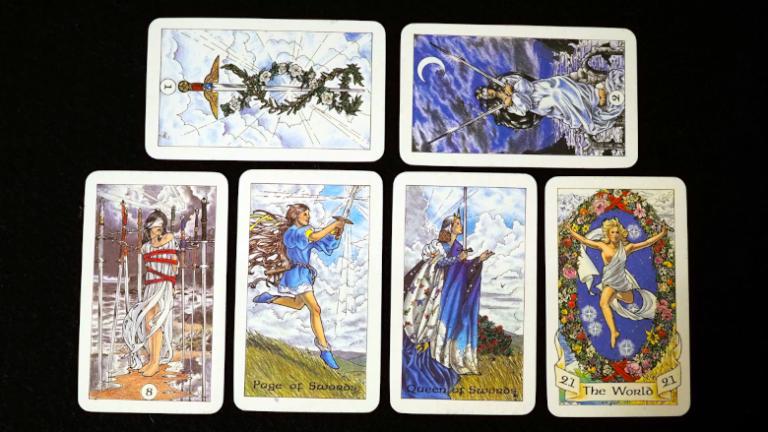Occasionally I hear someone – almost always a conservative Christian – say “if there is no God then life has no meaning.”
Perhaps the best response to this came from an atheist, who said “if there is no master, whose slave will I be?”
I’m a polytheist who finds great meaning in serving my Gods, but I’m far closer to the second statement than to the first. Because finding meaning in life doesn’t require Gods, much less any one particular God.
It just requires a choice.
What we mean by “meaning”
“What is the meaning of life?” is one of those questions people have been thinking about for at least as long as we’ve been human, and likely will be thinking about until our species is gone from the ordinary world.
Why are we here? What is the purpose of life? What is the purpose of my life? What brings genuine happiness and true satisfaction? What is valuable? Do we matter? Do I matter? Over the centuries different people have come up with different ideas – different philosophies. Some are better than others. Some are well-suited to one environment and culture and poorly suited to others.
It’s one thing to argue that your philosophy of life is better than others. Despite my emphasis on philosophical diversity and the necessity of choosing, I’m doing that here. But it’s another thing entirely to insist that meaning can only come from one particular religious outlook and tradition.
Exclusivist religions demand control over meaning
Religions that insist their way is not just a good way or even the best way but the only way demand control over everything. They demand control over the foundational concepts of life: metaphysics, theology, ethics, and especially the political processes by which these concepts are put into practice in the wider world.
This demand for control comes from the fear that no one is at the wheel. That’s a very deep fear. Christians talk about “God’s plan” but New Agers talking about “the Universe” do the same thing. So do conspiracy theorists who would rather believe everything is controlled by the Illuminati or the Deep State or Reptilian Overlords than to accept that no one is in charge and life is far more random than we’d like to admit.
But if meaning is to be found anywhere, it must be found in truth. And while I’m convinced that Ultimate Truth is beyond our capacity to know, much less to understand, I’m equally convinced that there is no Grand Plan of the Universe, and there is no Supreme Being who is handing out meaning.
We have to find it for ourselves.
The search for meaning is a privilege
I often say “it’s hard to be spiritual when your roof is leaking.” It’s hard to search for meaning when you’re focused on survival. This post is about choices and our mainstream society puts a lot of emphasis on making good choices, but a meme I see occasionally says “you didn’t make good choices – you had good choices.”
The ability to search for meaning and to choose meaning is a privilege. But as with all privileges, the best approach is not to remove it or to deny it exists, it’s to use it for good and to share it as widely as possible.
And so if you’re able to think about meaning, to think about the higher purposes of life, I encourage you to do so – and then to choose the approach you think is most likely and most helpful.
Meaning and the many Gods
In the fight between atheism and fundamentalism, I’m almost always on the side of the atheists. But I am not an atheist. I’m a polytheist who has experienced several of the many Gods and who is as convinced of Their reality and divinity as can be, given that certainty in such matters is not possible.
And I find great meaning in worshipping and serving Them.
Forming and maintaining relationships with the Gods connects me to Their values and Their virtues. Those values and virtues are good ways to live. Further, the Gods don’t just hang out on Mount Olympus or the regional equivalent thereof. They’re moving in this world, doing things I don’t entirely comprehend but am honored to be a part of.
But even when it comes to the Gods, we almost always have a choice – and not the worship-me-or-burn-in-hell-forever “choice” the fundamentalists say their God gives people. Sometimes Gods claim people. But far more frequently, They call people to Their service. If you say yes, great. If you say no, They move on to someone else.
And if no one calls you? Then your choices are wide open. Follow those whose stories resonate with you, whose virtues you need in your life, who strike you as particularly noble, or just interesting.
I have found great meaning in Cernunnos, Danu, the Morrigan, and the other deities with whom I have on-going relationships. But that’s not the only place I find meaning and purpose, and it’s certainly not the only place you can find it either.
The first choice: accepting that you must choose
The first step in choosing meaning is accepting that you must choose. Because if you don’t, other people will choose for you. They’ll tell you your only real choice is whatever they’re selling, whether that’s religion, politics, or whatever overpriced consumer goods they’re offering as a substitute for real meaning and purpose. Refusing to choose is itself a choice – a choice to seek meaning in whatever is readily available, or worse, to decide that life is meaningless and the only option is bouncing from whim to whim.
Instead, begin by choosing to find and make meaning in the ways that are best for you, not for someone who’s trying to sell you something.
The second choice: searching
If finding meaning and purpose was easy, people wouldn’t have been arguing about it – with each other and with themselves – for millennia. It’s hard – that’s one of the reasons so many people are eager to latch onto someone else’s thinking.
What interests you? What moves you? What fills your soul with joy – or with righteous anger? Where can you promote the flourishing of life? Where can you reduce suffering and harm in the world? Liberal Christian theologian Frederick Buechner said your calling in life “is the place where your deep gladness and the world’s deep hunger meet.”
Don’t mistake this for a career search. How you make a living and how you make a life are two different things. That’s OK – you don’t need to do something full time for it to be meaningful in your life. It’s often best that you don’t. Otherwise, your deepest calling can turn into just another job.
Choose to do the hard work of searching for meaning.
The third choice: making a tentative choice
Some people spend their lives grazing at the spiritual buffet. A little of this, a little of that, hey what’s that over there I’ve never tried? People who call themselves seekers often forget that the purpose of seeking is to find something.
At some point we need to say “I’m going to follow this path and see where it leads.”
Where might you find meaning and purpose? In worship? In service? In learning? In art? In research? In caring for others? In political activism? In becoming the best person you can be, whatever that means to you? Finding meaning and purpose doesn’t mean becoming a vocational monogamist, but it does mean not spreading yourself so thin you’ve got no time and energy for depth.
Pick the one you like best. Pick the one you’re best at doing. Pick the one that does the most good, as best you can tell.
Just pick something.
The fourth choice: perseverance
Few things of meaning are easy. Their meaning comes because they’re difficult, complicated, or just really really important. This means that at some point, things are going to get hard. There will be obstacles. You will feel like jumping to something else, or just giving up.
Keep moving. There is value in perseverance.
Perhaps you will get to the point where you realize you were wrong and this isn’t the path for you. If so, it’s OK to quit and try something else. Just don’t quit too early.
Choose to keep going when things get hard.
The fifth choice: reflection, review, and choosing again
If all goes well, your first choice turns out to be a good choice and you find meaning in that vocation for the rest of your life. But maybe you don’t. Or maybe something that’s fulfilling in one decade of your life stops being fulfilling in another.
We learn, we grow, we change – where we find meaning sometimes changes. We owe it to ourselves – and to the wider world – to keep thinking about meaning and purpose. Just as we make a conscious decision to follow a path, we need to make informed and conscious decisions to keep following it in the future.
Or not.
My purpose has not changed since I approached adulthood. But how I fulfill that purpose has changed several times, and it’s changing again. Of course it is – I’m nearing the end of my paying career, with all that involves. And the spiritual environment that provided so much meaning to me in the last decade has changed dramatically. The many Gods will always be a key part of my spiritual foundation, but how I serve Them will change. Is changing.
And I have to choose what that change will look like. A Tarot reading for insight was filled with Swords: the suit of making clear, sharp distinctions and decisions.
The Gods will be part of my meaning and purpose, but They are not dictating what that meaning and purpose will be. They’re telling me to go find it.
They’re telling me to choose.
And so I will.
And I hope you will too.

















